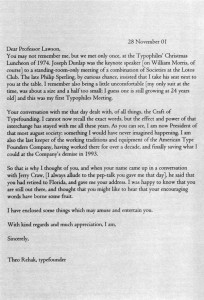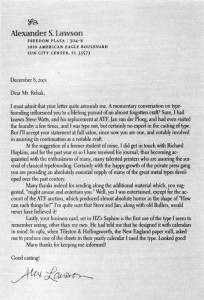For Fra Alexander
In the summer of 1974 I had joined the William Morris Society and had made the acquaintance of its North American Secretary, Joseph Riggs Dunlap. During a visit to him in the fall, he had invited me to a “little” December talk he was going to do at the Lotos Club, an exclusive Manhattan venue for all things literary, academic and sometimes political. The African-American wait-staff wore white uniforms, suits and gloves. The height of decadence it seemed and I feared, with my Morrisian-Socialist mind set.
I felt conspicuously out of place, and definitely beyond my depth, clad in my only suit, a size too small and redolent of the cedar closet. It was a sea of humanity, packed into the main dining room, which was populated with the elite of the academic, literary famous, and powerful graphists of the time. Fortunately I had arrived early. Joseph himself hailed me, alighting from a cab, and actually held the door for me to enter the building. It was typical of the man, who would become friend and mentor over the next decades.
The event was a multi-societal gathering, heavily attended from the constituency of three organizations in particular: The William Morris Society; APHA; and The Typophiles. It was standing-room-only and I sensed that Joseph saw my bewilderment. He quickly handed me off to a good colleague of his, Philip Sperling, then Secretary of The Typophiles. Sperling was an intense, busy fellow dressed nattily in his tweed jacket, cravat, and diamond lapel-pin. He immediately insisted I should take his place at a forward table, and before I could protest, he ran off. I found myself sitting with some tacet, bored-looking academics; all that is, save one. The person on my left, who offered his hand and introduced himself as Alexander Lawson.
I wish I could claim that this began a wonderfully long association with him, but it was in fact the only time we would meet. As we talked, he became aware of something in my discourse, which piqued his interest and curiosity: it was printing type. I also regret that I cannot now remember the exact context of what we said to each other, save that he instilled within me the desire to cast my own foundry type. He spoke with such awe and power, I was very moved, yet was he also instantly and respectfully modest with his audience of one; thus he held forth as all good teachers do in common. In that 30 minutes or so before Joseph’s keynote performance, he would spark and light a course that would carry me through many years and a life’s work as a type founder.
Over these past years I have often thought about him and one day, after obtaining his new address in retirement, delighting in the fact to find him still alive and active, I resolved to write a letter of appreciation to him. It appears in The Fall of ATF, my privately printed chronicle of the last days of The American Type Founders Company, along with his gracious response.
It seems implausible, that such a chance meeting, brief as it was could be so rewarding, and in so many ways.
Profoundly gifted men and women can often pass through our lives with no premeditation of their own; and it is but the reward of Fate alone, which causes our paths to cross.
The key is to be there and more importantly, to listen.
Theo Rehak
The Dale Guild Type Foundry
Howell, New Jersey
A tip of the TypoChapeau to Barth Vader for granting permission to post his letters to & from Prof. Lawson.


[…] I expected to see Steve Watts name mentioned, but I was not prepared to read Theo’s admonition crediting Prof. Lawson for inspiring him to pursue the craft of type founding. I immediately dispatched an electronic missive to Theo and a couple days later I received a lovely essay entitled “For Fra Alexander”. […]